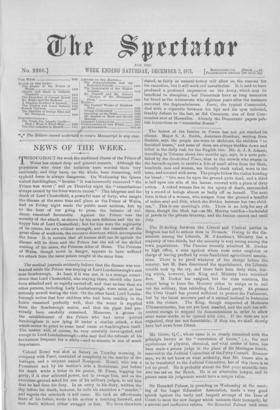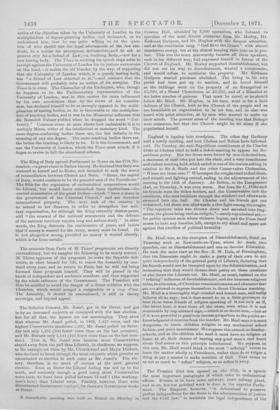Sir Roundel! Palmer, in presiding on Wednesday at the meet-
ing of the Legal Education Association, made a very good speech against the tardy and languid attempt of the Inns of Court to meet the new danger which menaces their monopoly, by a partial and ineffective reform. Sir Roaudell Palmer took some
notice of the objection taken by the University of London to the multiplication of degree-granting bodies, and intimated, as we understand him, that he was quite willing to let the ques- tion of who should test the legal attainments of the law stu- dents, he a matter for subsequent deliberation, and to ask at present only for a School of Law,—a teaching body,—not for a new testing body. The Times in noticing his speech steps aside to inveigh against the University of London for its jealous narrowness on this head, —it makes the old blunder, by the way, of supposing that the University of London which, is a purely testing body, has a School of Law attached to it,"—and assumes that the Government will probably take no notice of its scruples. The Times is in error. The Chancellor of the Exchequer, who, though he happens to be the Parliamentary representative of the University of London, was in this matter far more influenced by his own convictions than by the views of his constitu- ents, has declared himself to be as strongly opposed to the multi- plication of testing bodies, as he is favourable to the multiplica- tion of teaching bodies, and it was to his Ministerial influence that Sir Roundell Palmer yielded when he dropped the word " Uni- versity." Common-sense at once shows how undesirable it is to multiply Mints, either of the intellectual or monetary kind. The more degree-conferring bodies there are, the less definite is the meaning of any one degree. The more teaching bodies there are, the better the teaching is likely to be. It is the Government, and not the University of London, which the Times must attack, if it hopes to revive in full the abandoned scheme.



































